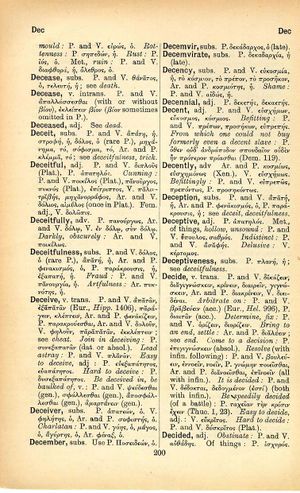deceptive: Difference between revisions
From LSJ
Ὁ δὲ μὴ δυνάμενος κοινωνεῖν ἢ μηδὲν δεόμενος δι' αὐτάρκειαν οὐθὲν μέρος πόλεως, ὥστε ἢ θηρίον ἢ θεός → Whoever is incapable of associating, or has no need to because of self-sufficiency, is no part of a state; so he is either a beast or a god
(Woodhouse 2) |
(CSV3) |
||
| Line 1: | Line 1: | ||
{{ | {{Woodhouse1 | ||
| | |Text=[[File:woodhouse_200.jpg|thumb|link={{filepath:woodhouse_200.jpg}}]]'''adj.''' | ||
P. [[ἀπατηλός]]. | |||
Met., <b class="b2">of things, hollow, unsound</b>: P. and V. [[ὕπουλος]], [[σαθρός]]. | |||
<b class="b2">Indistinct</b>: P. and V. [[ἀσαφής]]. | |||
<b class="b2">Delusive</b>: V. [[κέρτομος]]. | |||
}} | }} | ||

